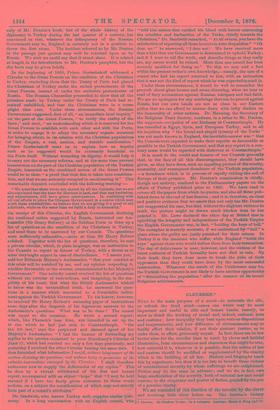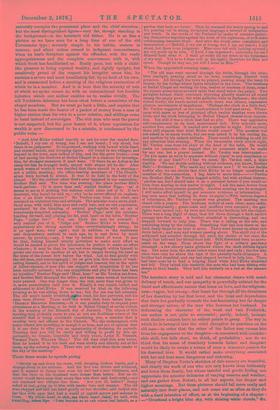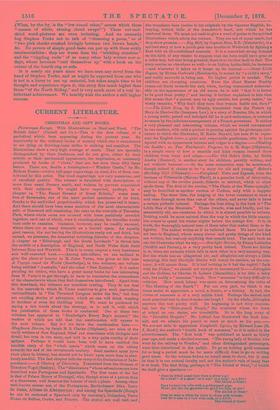CLEVEDEN.* NEXT to the main purpose of a novel—to entertain
the idle, or refresh the tired mind—comes one which may be most important and useful in able and honest hands, namely, to show in detail the working of social and, indeed, national, laws and customs ; how unequally they bear upon various dispositions and temperaments, and how difference of circumstances may so fatally affect their relative, if not their abstract justice, as to make them, in effect, grievously unjust. In fact, there can be few better aims for the novelist than to teach by clever and faithful illustration, from circumstances and characters that might be true, how essential it is, wherever it is possible, that the action of law and custom should be modified or supplemented by the charity which is the fulfilling of all law. History and biography teach this by experience, but then it is too late to benefit those victims of unintentional severity by whose sufferings we are enlightened. Fiction may do the same in advance ; and we do, in fact, owe large amelioration of the severity, both of national law and social custom, to the eloquence and genius of fiction, guided by the pen of a genuine charity. We are reminded of this function of the novelist by the clever and touching little story before us. The heroine's history • Cleveden. By Stephen Yorke. In 2 volume'. London: Henry S. Sing and Co.
naturally occupies the prominent place and the chief attention ; but the most distinguished figure—very far, though standing in the background—is the heroine's old father. He is as fine a picture as we have seen for a long time of one of the old Covenanter type ; severely simple in his habits, austere in manner, and silent unless roused to indignant remonstrance, when he hurls Scripture against the offender, with the ready appropriateness and the complete conversance with it, with which Scott has familiarised us. Really poor, but with a child- like pleasure in being reputed wealthy, and rigidly upright, but sensitively proud of the respect his integrity earns him, he sustains a severe and most humiliating fall, by no fault of his own, and is summoned before a meeting of the religious connection of which he is a member. And it is here that the severity of rule of which we spoke comes in, with an unintentional but forcible injustice which our author enables us to realise vividly. The old Yorkshire dalesman has been cited before a committee of the chapel members. But we must go back a little, and explain that he has been made the bearer of a packet of money from a man of higher station than his own to a poor relative, and shillings come to hand instead of sovereigns. The rich man who sent the parcel
is not suspected, but the poor bearer of it, whose reputation for wealth is now discovered to be a mistake, is condemned by the public voice :— " And Abel Kirke walked heavily to and fro over the sanded floor. Behold, I cry out of wrong, but I am not heard ' • I cry aloud, but there is no judgment.' So he groaned, walking with bowed white head,
and crossed hands, and drooping figure. All round in the villages, and beyond in the town, men talked of him, and the din grew louder,—rose at last among the brethren at Bethel Chapel to a clamour for investiga- tion, for stronger measures if need were. 'If there be an Achan in the
camp let him be brought forth, stoned with stones till he die.' After much waste of words it was decided that there should be a meeting—
not a public meeting ; the office-bearing members of ' The Church' alone were invited to attend. It was to be held in the body of the chapel. 'It's the saddest affair that's ever 'appened in our connection,'
brother Hall said. The time was evening; the place brother Hall's back-parlour. 'It is more than sad,' replied brother Page ; an' it seems to me as if nothing but sadness could come out of it. If he's innocent, why hasn't he said so,—why 'as he never offered no explana- tion o' no kind whatsoever?' Mr. Verdon rose from his chair, and assumed an oratorical tone and attitude. The minister was a stout, pink- faced man, with mild, blue eyes and curly hair, and an odd expression, produced by the blending of natural good-spirits with an air of consciously-acquired solemnity. ' Brother Page,' said the minister, bending forward, and placing his fat, pink hand on the table, Brother Page, " judge not !" You can finish the text for yourself : I only remind you of it, " Judge not." Brother Kirke is aware that appearances are strong against him,—overwhelmingly strong; he is an aged man, very aged ; and in addition to the feebleness and despondency natural to such age, he is cast down by much sorrow, by poverty,—nay, I fear by actual dread of want. It may be that, feeling himself utterly powerless to make such effort as would be needed to prove his innocence, he prefers to make no effort whatever ; it may be that he has not even strength within himself to prefer one course to another at all, but is simply bowing his head as the trees of the forest bow before the wind. Let us deal gently with the old man, and encouragingly ; let us give him this chance of vindi- cating himself, not in the spirit of judges and censors, but in the spirit of fellow-sinners, of men who can support and sympathise if he has been unjustly accused •, who can sympathise and pity if there has been no injustice." Brother rage said ' Hear, hear 1' as Mr. Verdon sat down, and brother Hall thumped the table • and then some notes of invitation were penned. One was longer than the red, more time was given to it, more consultation held over it. Finally it was copied, folded, and addressed to Abel Kirke. It was received by Abel on the following evening as he was sitting down to tea; but the tea was left untested. The old man's hands trembled Atigt,he read, his lips quivered, and his eyes were dilated. These were the words that were before him DEARLY BELOVED BROTHER,—It is our painful duty to request your attendance at a Meeting, to be held in Bethel Chapel at seven o'clock in the evening of the fifteenth day of January. The object of this meeting may probably occur to you, as you are doubtless aware of the scandal that is being circulated concerning you, a scandal that is causing very sad offence to the Church. We, the undersigned, with many others, are unwilling to accept it as true, and are of opinion that it is our duty to offer you an opportunity of declaring its untruth. Trusting that you will be ready and willing to profit by this op- portunity, we remain, hopefully and truly yours, LURE E. VERDON, THOMAS PAGE, WILLIAM HALL. The old man read this note twice, then he locked it in his desk and went slowly and silently out of the room, up the echoing stair. There was yet more than three weeks to the day of the meeting."
Those three weeks he spends pacing
" Slowly up and down the room, with hanging, listless hands, and a strange droop in his attitude. And his face was drawn and withered, and it seemed to Jenny that even his hair had a new whiteness, and that the lines on his forehead were deeper than before. But an ob- server would have seen that every line was clear and horizontal,—not one confused nor oblique line there. Are you ill, father?' Jenny asked at last, going up to him with tender tone and manner. The old man stopped and laid one hand gently on her shoulder, and looked into her face with eyes that had a -world of untold sorrow and sadness in them. My whole head is sick, say whole heart faint,' he said, with trembling, ashen LIND1 become as an oak whose leaf fadeth, as a
garden that hath no water.' Then he resumed his heavy pacing to and fro, pouring out in strong Scriptural language a torrent of indignation and wrath. In the words of the Psalmist he spoke of enemies gather- ing themselves together against the souls of the righteous, of evil-doers condemning innocent blood. And after the wrath came complaint and lamentation :—' Behold, I cry out of wrong, but I am not heard ; I cry aloud, but there is no judgment. Mine eyes fail with looking upward ; my cry goeth up in vain. 0 Lord, I am oppressed ; undertake for me t Himself bath done it. I shall go softly all my years in the bitterness of my soul. Yet have I done evil in his sight ; therefore let Him not spare. Theugh he slay me, yet will I trust in Him.'"
When the appointed evening came,— " The old man went onward through the fields, through the clear, blue starlight, praying aloud as he went, comforting himself with promises. All through the town he prayed, passing along the lamp-lit streets, by the bridge where lights twinkled in the river. The brethren at Bethel Chapel sat waiting for him, twelve or fourteen of them, round the square green-baize-covered table that stood below the pulpit. Two gaslights burned dimly overhead, throwing ghastly shadows all round among the empty pews; the wide galleries were in darkness; the clock ticked loudly, the hands moved onward, there was silence, expressive glances, movements of impatience. 'Perhaps the clock is a little fast,' Mr. Verdon suggested, as the hands pointed to half-past seven. Where- upon with more or less of physical effort twelve watches were drawn forth, and the clock belonging to Bethel Chapel cleared from imputa- tion. Yet still it was a clock that had no pity. There was aggressive self-complacency in its loud, monotonous tick. Five minutes more, another five, another. It wanted now a quarter to eight. Did anybody there still suppose that Abel Kirke would come ? The question was not asked in so many words, but one man asked it by his curling lip, and another by his unbent attitude. There would be nothing to call for any attention that evening. When the inexorable clock struck eight, Mr. Verdon rose from his chair at the head of the table. He would make no comment,—he begged that no comment night be made by any one, but a prayer instead. Mr. Verdon was interrupted:- ' Do you mean as we're to separate without comin' to any conclusion or decision of any kind ?'—'I fear we must,' Mr. Verdon said, a little timidly. ' We can decide nothing without evidence, you know, Brother Hall.'—' Evidence ! Who needs any evidence now ? If we can decide nothin' else, we can decide that Abel Kirke be no longer considered a member of this connection. I beg leave to move that,—'—' Pardon me, Brother Hall,' Mr Verdon begged mildly, but with evident distress, pardon me, but I should take it as a personal favour if you would re- frain from moving in this matter to-night. I ask the same favour from the brethren here present generally. Another meeting can be arranged. I will make effort myself to get accurate evidence or information. I beg once more that nothing be done to-night.'—With various degrees of reluctance, Mr. Verdon's request was granted. The meeting was closed with a prayer. The brethren looked at each other, some sadly, Some triumphantly ; great-coats and mufflers were resumed; the gas- lights were turned out; by twos and threes the brethren left the chapel. There was a long flight of steps, that led down through a dark narrow passage into the street. A brother stumbled in descending, and one stepped forward to help him. There was a railing at the side, and something lying by the railing. Something that had lain there on the dark damp steps for an hour or more. There were houses on either side down below ; and men and women passing about. The shrill cry of the milkmaid bad sounded through the yard, the clatter of her cans, the laugh that followed her thread-bare jest. Still, there had been no move- ment on the steps. From above the light of a solitary gas-lamp streamed ; a few silvery hairs glittered where the dark stirless figure lay. The noise from the street below came loud and rude ; the few dim stars were very far above the tops of the quaintly-built chimneys. A. brother had stumbled, and one had stepped forward to help him. There had been none by to lend a helping hand when Abel Kirke stumbled and fell. They raised him tenderly, the men who had been sitting with stones in their hands. They laid him tenderly on a bed at the nearest inn."
The heroine's story is told and her character drawn with much delicacy of touch, and our sympathy is powerfully enlisted for the timid and affectionate nature that leans on love, and the religious- ness—vague, but strong—that bears her through all the dreariness of her desertion by her first lover, and the trust and dependence that draw her gradually towards the less fascinating but far deeper and stronger nature of the man who becomes her husband. In delineating the character of the weak and vain Frederick, our author is not quite so successful ; partly, indeed, because such shallow natures have no salient points to grasp. The way in which he is betrayed into the cruel deception he practises on the old man—in order that the crime of the father may excuse him from his engagement to the daughter—is conceived with consider- able skill, but falls short, we think, of probability ; nor do we think that his sense of treachery towards father and daughter would be likely to create a return of even a transient passion for his deserted love. It would rather make everything associated with her and hers seem dangerous and sickening.
Many of Stephen Yorke's sketches of dale scenery are beautiful, and clearly the work of one who not only knows them intimately and loves them dearly, but whose tasteful and poetic feeling can appreciate the minuter delicacies of varying seasons and weather, and can gather from Nature, in all her aspects, her deeper and higher meanings. But these pictures should fall more easily and naturally into their places, and not come out so often as they do with a hard intention of effect, as at the beginning of a chapter : —"Overhead a bright blue sky, with shining white clouds," &c.
(What, by-the-by, is the "low-toned ether," across which these "masses of white, shining cloud swept?") These cut-and- dried word-pictures are even irritating. And we earnestly beg Stephen Yorke not to talk of "dreaming a poem," or of "two pink cheeks crushed lovingly between two brown hands," &c. No person of simple good-taste can put up with these sickly sentimentalities ; they are worse than the "trickling sunshine" and the "rippling smile" of so many other lady writers now-a- days, whose heroines "curl themselves up" with a book on the corner of the hearth-rug or sofa.
It is nearly six years since we have seen any novel from the hand of Stephen Yorke, and as might be expected from one who is not in a hurry to use up material, but takes ample time to let thought and experience ripen it, this story flies much higher than those "of the North Riding," and is very much more of a real in- tellectual achievement. We heartily wish the author a still higher
success.




































 Previous page
Previous page